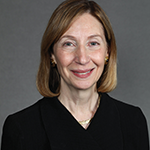Overall, the available treatments are “not that great,” Dr. Rubin said.
“I don’t know that we can do better over a very short term, but there are still trials ongoing, and I am mildly optimistic about those,” he said. “Finally, we know how to prevent infection. We certainly know the public health measures that work. It would be great if they could be more robustly implemented.”
Presidential Address
ACR President Ellen Gravallese, MD, chief of the Division of Rheumatology, Inflammation and Immunity at Brigham and Women’s Hospital, Harvard Medical School, Boston, said rheumatologists have “risen to many challenges with hope” since COVID-19 struck—from starting registries to collect data on patients with rheumatic diseases who contracted COVID-19, to creating a virtual lecture series for fellows, to developing patient-facing safety documents and written guidance for physicians.
“What I have witnessed in the field of rheumatology in response to this pandemic has been nothing short of remarkable,” Dr. Gravallese said.
She said the pandemic has left rheumatologists and the ACR with several lessons:
1. As the content experts in immunology, our knowledge and insights are highly relevant. Rheumatologists should be “in the room where it happens” when it comes to directing care of patients with diseases that impact the immune system, designing clinical trials, and designing and using vaccines, she said.
2. To respond rapidly and effectively in a crisis, we need to rethink our organizational structure. As the pandemic hit, the ACR started getting calls from members asking how to treat patients—in particular, how to manage patients taking immunosuppressive drugs.
“We quickly realized we needed a more nimble organizational structure to address the concerns of members,” Dr. Gravallese said. This need gave rise to three task forces on clinical guidance for a variety of patient groups and topics, which had to process new data in real time as the pandemic kept unfolding. A task force was also convened to address issues for members in practice and for advocacy at the federal level.
3. We can’t do it alone. The task forces included experts in infectious disease, cardiology, pediatrics and epidemiology. Dr. Gravallese said, “collaboration with experts in other fields of medicine is critical.”
4. Telehealth is changing the way we practice medicine, but is it a virtually perfect solution? Rheumatologists were among the early adopters of telehealth once the pandemic hit, and Dr. Gravallese highlighted the “great promise for this modality in the future beyond this pandemic, assuming reimbursement for it can be maintained.” Telehealth could help expand the reach of rheumatology into underserved communities and help alleviate the rheumatology workforce shortage, she said.




